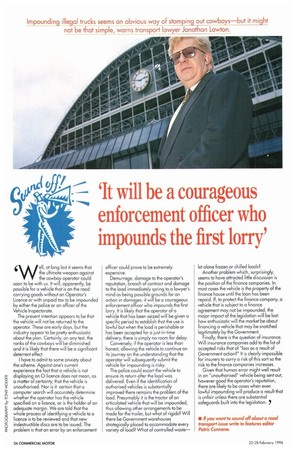'It will be a courageous enforcement officer who impounds the first lorry'
Page 38

If you've noticed an error in this article please click here to report it so we can fix it.
all, at long last it seems that the ultimate weapon against the cowboy operator could soon to be with us. It will, apparently, be possible for a vehicle that is on the road carrying goods without an Operator's Licence or with unpaid tax to be impounded by either the police or an officer of the Vehicle Inspectorate.
The present intention appears to be that the vehicle will not be returned to the operator. These are early days, but the industry appear to be pretty enthusiastic about the plan. Certainly, on any test, the ranks of the cowboys will be diminished and it is likely that there will be a significant deterrent effect.
I have to admit to some anxiety about the scheme. Against one's current experience the fact that a vehicle is not displaying an 0-licence does not mean, as a matter of certainty, that the vehicle is unauthorised. Nor is it certain that a computer search will accurately determine whether the operator has the vehicle specified on a licence, or is the holder of an adequate margin. We are told that the whole process of identifying a vehicle to a licence is to be reviewec and that new indestructible discs are to be issued. The problem is that an error by an enforcement
officer could prove to be extremely expensive.
Demurrage, damage to the operator's reputation, breach of contract and damage to the load immediately spring to a lawyer's mind as being possible grounds for an action in damages: it will be a courageous enforcement officer who impounds the first lorry. It is likely that the operator of a vehicle that has been seized will be given a specific period to establish that the use is lawful but when the load is perishable or has been accepted for a just-in-time delivery, there is simply no room for delay. Conversely, if the operator is less than honest, allowing the vehicle to continue on its journey on the understanding that the operator will subsequently submit the vehicle for impounding is risky.
The police could escort the vehicle to ensure its return after the load was delivered. Even if the identification of authorised vehicles is substantially improved there remains the problem of the load. Presumably it is the tractor of an articulated vehicle that will be impounded, thus allowing other arrangements to be made for the trailer, but what of rigicls? Will there be Government warehouses strategically placed to accommodate every variety of load? What of controlled waste—
let alone frozen or chilled loads?
Another problem which, surprisingly, seems to have attracted little discussion is the position of the finance companies. In most cases the vehicle is the property of the finance house until the loan has been repaid. If, to protect the finance company, a vehicle that is subject to a finance agreement may not be impounded, the major impact of the legislation will be lost: how enthusiastic will the market be about financing a vehicle that may be snatched legitimately by the Government.
Finally, there is the question of insurance. Will insurance companies add to the list of accepted risks that of "loss as a result of Government action?" It is clearly impossible for insurers to carry a risk of this sort so the risk to the finance companies increases. Given that human error might well result in an "unauthorised" vehicle being sent out, however good the operator's reputation, there are likely to be cases when even lawful impounding will produce a result that is unfair unless there are substantial safeguards built into the legislation.
• If you want to sound off about a road transport issue write to features editor Patric Cunnane.




































































































